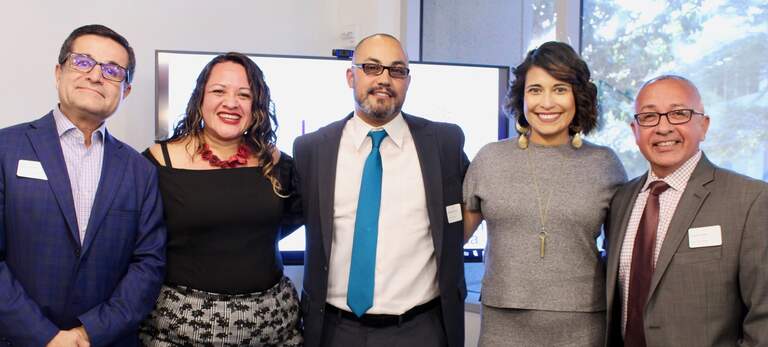“I am American. I am Mexican. I am the daughter of an immigrant father and first-generation Chicana.”
“I have been told I sound like a ‘Valley girl’ and sound nothing like a Latina. I have been told my Spanish is ‘good for being American.’”
“I have been told my caramel complexion is deceiving because I “look Mexican,” but sound like a ‘gringa.’”
Many members of the LatinX-American community have heard these types of statements. This creates an atmosphere where LatinX people not only face imposter syndrome in the country we are born in, but struggle with imposter syndrome within our own LatinX community. We’re not American enough for our country and we’re not LatinX enough for our brown community.
But what defines being American? What defines being LatinX?
These are the kinds of questions iMentor Bay Area explored during the inaugural “Cultivate to Educate” speaker series. This new quarterly panel serve as a platform to promote diversity, social justice, empowerment, and community. We kicked off the series by celebrating National LatinX Heritage Month, in which people recognize the contributions of Hispanic and Latino Americans to this country’s history, heritage and culture.
Celebrating LatinX Heritage
iMentor Bay Area hosted a panel of LatinX leaders who reflected on growing up LatinX, challenges in education and the workforce, and their hopes for the future of our community. Speakers included Damian Trujillo, a local champion of our cause and Emmy-winning reporter for NBC Bay Area; Angel Chavez, vice president at Morgan Stanley: El Camino Group; Janeen Mendoza Cruz, executive director of Next Generation Scholars; Christian De La Cruz, vice president and general manager at Bay Area radio station 93.3 La Raza; and Karla Monterroso, chief executive officer of CODE2040.
The work of these leaders in the LatinX community spans across sectors from philanthropy, nonprofit, finance, and media. Their stories were truly inspirational, especially because it is still rare to see people of color in positions of power and influence.
Janeen, who served as program officer at Tipping Point Community before becoming executive director at Next Generation Scholars, said she recognized that despite her titles, people will still perceive her, first, as a “brown woman.” This identity, however, is by no means a deficit, but a unique strength. “As you get asked in spaces of power and privilege, know that you belong there. That you're worthy of being there,” said Janeen. “Don't doubt that space and why you're there. Own that space, own your power, own your voice.”
Angel recalled that he hardly had any LatinX mentors as he rose up the ranks in the financial sector. He even admitted, “I didn’t know I was ‘Latino’ until I was in the workforce.” But now, leaders like Angel are becoming mentors for future generations. He understands and embraces the responsibility of being one of few LatinX leaders in the banking industry.
Karla, whose current work involves creating avenues for brown and black youth to enter the tech community and fully participate in the innovation economy, also discussed what it means to be among the few LatinX in high wage fields. Her organization’s name—Code2040—brings to mind the year in which the majority of Americans will be Black and LatinX. And yet, Black and LatinX individuals have, historically, held lower-wage jobs and have had less access to higher-paying work, especially in the tech field. Karla implored, “If we are going to position us to be proportionally represented in high wage work, it's also going to have to be on purpose." In other words, in order to make high-paying jobs of the future accessible for all, we need to make the road to such jobs more equitable now.
For Christian, when he thinks of the future for the LatinX community, he can’t help but think of his own children, and of how critical it is for him as their father to be highly involved. “I look at my two boys--one’s 14 and one’s 10. I’m super involved with them not because I want to micromanage, but because I care. I want them to be a success.” Christian notes that he shares his experiences, knowledge, wisdom with his children in the hopes that they will do the same for their own kids.
The evening’s moderator, Damian, shared the wisdom he tells his daughter: “Mija, your job hasn’t even been created yet.” He recognized that it is the LatinX community’s responsibility to help open doors for younger LatinX generations because they will be the backbone of our future workforce. All the panelists echoed the sentiment that young people need to believe they can be powerful contributors to our country—politically, socially, economically, and culturally.
A Personal Journey
We LatinX individuals bring the azucar and spice to this multi-flavored nation. This country would not be the same without our food, culture, remedios, Spanglish, familia, and puro pinche pari.
Cultural identity is a personal journey. For me, my Mexican heritage was instilled in me from a very young age. We only spoke Spanish in our home, we ate tortillas y frijoles almost every day, and we always ate dinner together as a family. My apa taught us Spanish songs as he played his guitar. My mom taught us how to dance cumbias as we did our Saturday chores.
I am extremely grateful to have grown up with such a deep appreciation for my rich Mexican culture. I am even more grateful for having parents that embraced their kids’ gringo ways and allowing us to discover what being Mexican-American means to us. Because of my parents, I inevitably keep my culture ever present in my daily life.
To my brown brothers and sisters, if there is one thing I took away from our LatinX panel speakers, it was their message to take pride in who we are as brown people and to take our gifts and stories as far as we can.
Annel Aguayo is director of development at iMentor Bay Area.

